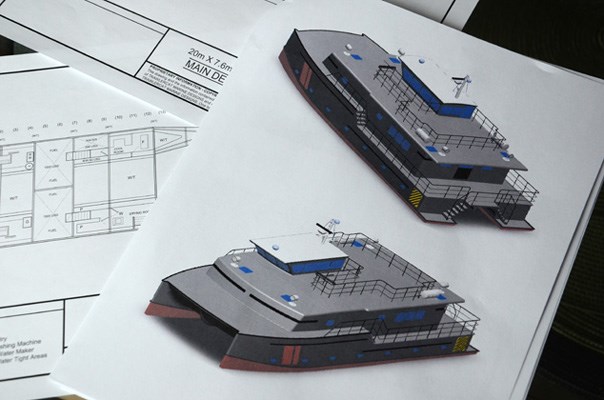A Queensborough man may have the solution to the very real threat piracy that is plaguing ships that move goods through the Arabian Sea.
Graham Pfister, a sea captain, ship designer and owner of Trawlercat Marine Designs, has designed what he says is the world's first purpose-built anti-piracy personal escort vehicles (PEV), designed for use in the pirate-infested waters off the Somali coast.
Armed pirates in small skiffs frequently hijack ships, and hold them, their crew and their cargo for ransom, which has become a very lucrative business since it began in the mid-2000s.
According to the International Maritime Bureau, 2011 saw 231 pirate attacks, 26 hijackings, 450 people were taken hostage and 15 were killed.
"This is what the world doesn't know - how dangerous this is. At this very moment there are 10 ships still being held and 172 seamen," Pfister said.
And like any successful business start-up, piracy is growing exponentially.
"They started off at about $250,000 ransom for a boat. Now they're up to about $15 million for some of these ships. It's really hurting the insurance companies and they're saying 'we've got to do something about this,'" Pfister said. "They've reached a crossover point where they're now paying out more money in ransom than they would have paid to have security on the ships."
Pfister said some companies have tried posting armed guards on their ships, but that creates significant logistical shipping problems as most countries, except Oman and Djibouti, will not allow a ship to come into port if anyone aboard is armed.
That's where Pfister's Visual Enforcer and Stealth Interceptor PEV 20-metre catamarans come in.
"The beauty of these vessels is they're long-range, live-aboard vessels. They can stay out months and months at a time purely and simply by arranging with one of the ships they're escorting to resupply them, refuel them and they can arrange those things at a distance," he said.
Pfister said a fleet of five of his PEVs could safely escort a convoy of up to 20 ships. The ships hold a crew of six security contractors, typically ex-military.
When it comes to getting into an actual skirmish at sea, the PEV has four ceramic-armoured firing positions towards the bow and stern. The deck also holds an optional mount for .50-calibre heavy machine gun - ample firepower to deter pirates, who typically carry AK-47s and, occasionally, rocket-propelled grenades, Pfister said.
Pfister said the catamaran design makes sense for a number of reasons. "Cats" are more stable than traditional mono-hull boats, because they have two centres of gravity spread out as opposed to just one that causes the boat to rock. They also cut through the water with less resistance, making them both faster and more efficient, and cheaper to run.
The PEV's hull is carbon fibre, which is both lighter and stronger than aluminum and easier to mass-produce once a mould is made.
The design makes the ships fast enough to zip between ships in a convoy at 25 knots and light enough to have a range of 8,000 kilometres on one fueling.
But, Pfister said, if the PEVs and security contractors do their jobs correctly, pirates will keep away from convoys they know are being escorted.
"Usually when the pirates see armed guards on board, they don't go. All of a sudden they become fishermen. But if they see a ship that's an easy target, they're making millions of dollars per ship if they capture it," he said. "The bad guys will not attack any ship that's got armed guards on it because they know they're going to lose."
United Nations member countries, including Canada, have contributed to anti-piracy efforts by sending ships to help patrol known pirate areas, but it's too costly and the area is too broad for the navies to be effective, Pfister said.
Depending on the options included on the boat, Pfister says they could be built for around $4 million. But a fleet of five would be able to offer more protection at a cheaper price than what the going rate for security is today. Pfister's business plan calls for a return on investment through insurance and security savings in two years.
Pfister's designs are already getting him inquiries from marine security companies and he's sourced out shipyards in Halifax and Seattle that would be capable and willing to do the construction.
With millions in ransom money and the lives of sailors on the line, Pfister said the shipping industry is coming to the reality that escorted convoys are now the only practical way to combat pirates. And he expects 2012 to be a big year for his PEV designs.
"It's just a far superior vessel," he said. "I've just got to get the first one built."
Trawlercat Marine Designs can be found at www.trawlercatmarine.com
www.twitter.com/BrentRichter



